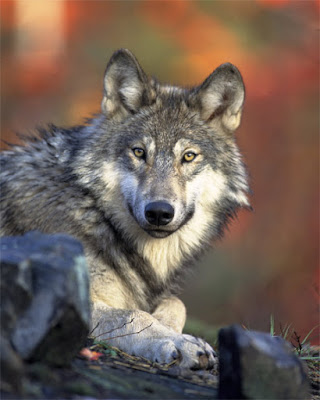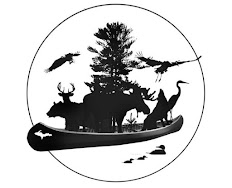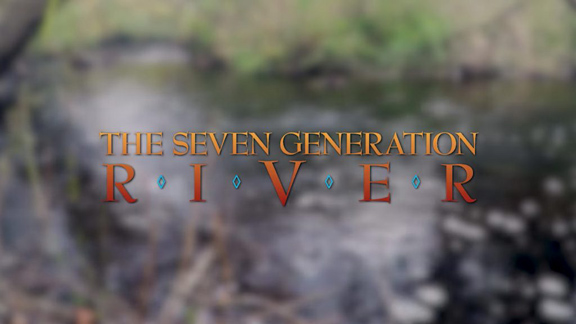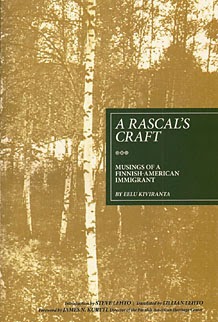Gray Wolf. (Photo © and courtesy Gary Kramer/U.S. Fish and Wildlife Service)
We are currently in the midst of an acrimonious debate in Michigan concerning management of gray wolves. For me this is an unwelcome déjà vu. Prior to retirement I supervised the endangered species program of the U.S. Fish and Wildlife Service in West Virginia and North Dakota. The gray wolf was on the federal list of endangered species in North Dakota during my tenure there. The common attitude of North Dakota landowners toward wolves was that they should be, and often were, shot on sight, even though it was a violation of federal law. During the 12 years I lived in Alaska, official state management included gunning wolves from the air, among other heinous practices.
One of the last acts of the Trump administration was the removal of the gray wolf from the list of endangered species, which returned management authority to the states. Last February a rushed wolf season in Wisconsin, contrary to the recommendations of the Wisconsin DNR, resulted in the harrying and killing of 216 wolves in four days, exceeding the quota set by the state by nearly 100 animals. Michigan is now conducting a public process designed to have the Wolf Management Advisory Council (WMAC) provide nonbinding recommendations to the state on wolf management. Many of the public comments made to the WMAC, and the attitude of many U.P. hunters, without any scientific basis, is that wolves pose a threat to the white-tailed deer herd, and thus the wolf population should be drastically reduced. Although it appears the DNR is attempting to follow a deliberative, science-driven process, they are being subjected to an all-too-familiar pressure campaign.
We too often hear public criticism of the Michigan DNR, and admonitions for them to "get on with it," to "stop kicking the can down the road," and similar criticisms. Such comments do not recognize the vital importance of engaging in a deliberative process, and of gathering all the information needed to make decisions on complex and controversial issues like wolf management.
I have been a hunter for much of my life, and I have passed that tradition on to my son, who is a Michigan hunter. I fully understand that deer hunters want to venture into the field with a reasonable chance of seeing and harvesting a deer. However, although the deer herd is managed for hunting, deer hunters have no special claim either to the deer or to the way wolves are managed. Non-consumptive uses of wolves -- to include simply the knowledge that they exist -- have equal, if not greater, inherent value as consumptive uses. These wildlife resources are part of our birth right as Americans, and they belong to all of us.
I believe we should view the issue of gray wolves in Michigan in a broader context. We are living through the Earth’s sixth mass extinction event of species and the collapse of ecosystems all over the world. Extinctions are occurring at a rate estimated at 100 to 1,000 times greater than natural background rates. The 2019 Global Assessment Report on Biodiversity and Ecosystem Services, published by the United Nations' Intergovernmental Science-Policy Platform on Biodiversity and Ecosystem Services, posits that roughly one million species of plants and animals face extinction within decades as the result of human actions. In this context we should bear in mind that the gray wolf was only removed from the list of endangered species in January this year, and the definition of endangered means that a species is in danger of going extinct.
The gray wolf is a keystone species, which means they have a greater effect on their natural environment relative to their abundance. Eliminating or greatly reducing keystone species can lead to ecosystem degradation or even collapse. Review of the relevant scientific literature points to the fact that wolves and the animals making up their prey base, if left to their own devices, will reach equilibrium.
As a recently restored meta-population of wolves, we must ensure that Michigan wolves will continue to be secure in healthy numbers far into the future. A majority of Michiganders surveyed take great pride in the fact that at least in the UP we have adequate suitable habitat, an adequate prey base, sufficient human tolerance, and years of dedication and hard work by the professionals at the DNR, the U.S. Fish and Wildlife Service (USFWS), non-governmental organizations, and concerned citizens -- resulting in a population of wolves sufficient to have them considered recovered. And by the way, a significant amount of taxpayers’ dollars have been spent in the recovery of wolves. Every wolf killed is in a sense being subsidized by the taxpayers.
Any decision on a wolf season must be based on the best available science. Research conducted over many years by the DNR clearly demonstrates that deer numbers are determined by many other factors other than predation by wolves. Research in the Upper Peninsula as well as in other locations in the country show that reducing the wolf population as a way to boost deer populations is not justified. A season on wolves must not be held as an experiment. Where would we find a control population? How would we control for other variables affecting the deer herd beyond wolf predation, such as disease, body condition, human harvest, weather, habitat and food availability?
Before any decision is reached on holding a wolf season, the DNR should first complete its revision of the Wolf Management Plan on the timeline determined appropriate by the Director -- and after conducting a thorough survey of all interested Michiganders, not just Yoopers. Killing wolves seems to be a winning issue among the science-denying crowd, and unfortunately a number of politicians are grandstanding and interfering with the process deemed appropriate by the wildlife professionals charged with managing this resource.
The current assault on wolves is calling into question the ability of states to responsibly manage this species. In Montana the hunting and trapping season in 2019 killed nearly 300 wolves. In Wyoming it is legal in most of the state to shoot wolves on sight as vermin or to chase a wolf on a snowmobile until it collapses and run over it until dead. (A bill outlawing this practice was resoundingly defeated in the legislature.) In Idaho it is legal to trap wolf pups outside a den and beat them to death. Contrary to expert opinion of the Idaho Fish and Game Department, a recent bill was passed to have 90 percent of the population (from ~1,500 to 150) killed by contractors, with no limit on private hunters, no closed season in most of the state, and allowing the use of motorized vehicles and night vision equipment. In Alaska the Trump administration allowed the destruction of wolf adults and pups in their den in national preserves. None of this is justified on a scientific or moral basis. This state mismanagement has resulted in calls for the Fish and Wildlife Service to place the gray wolf back on the endangered species list.
For those wolf hunt advocates who claim to be sportsmen and sportswomen who believe in fair chase, where is the outrage over such practices? In my view the only legitimate scientific reason for taking wolves is for those individual animals that have been documented as killing livestock or pets be removed by the DNR. There is certainly no compelling reason to hold a wolf trapping and hunting season based on the demands of a vocal minority. Above all, let’s make sure that in Michigan we manage our wolves scientifically and humanely and ensure that we never have to witness an uncontrolled slaughter like the one that occurred last winter in Wisconsin.**
Editor's Notes:
* Guest author Jeffrey Towner is a Certified Wildlife Biologist and member of the board of directors of the Upper Peninsula Environmental Coalition (UPEC).
** See these New York Times articles: "Wisconsin More Than Doubles Wolf-Hunting Quota, Angering Conservationists." (Aug. 11, 2021) and "Wisconsin Hunters Kill Over 200 Wolves in Less Than 3 Days." (March 3, 2021)
UPDATE: Some good recent news from Wisconsin: See "'Catastrophic and Irreparable Harm' to Wolves Averted as Wisconsin Judge Cancels Hunt."





































































































1 comment:
As I was reading this excellent article, I kept being tempted to highlight points that I found particularly powerful and/or exquisitely articulating what we all know to be true but don't say as well. If I had done that, I would have highlighted the whole thing. Thank you so much.
Post a Comment